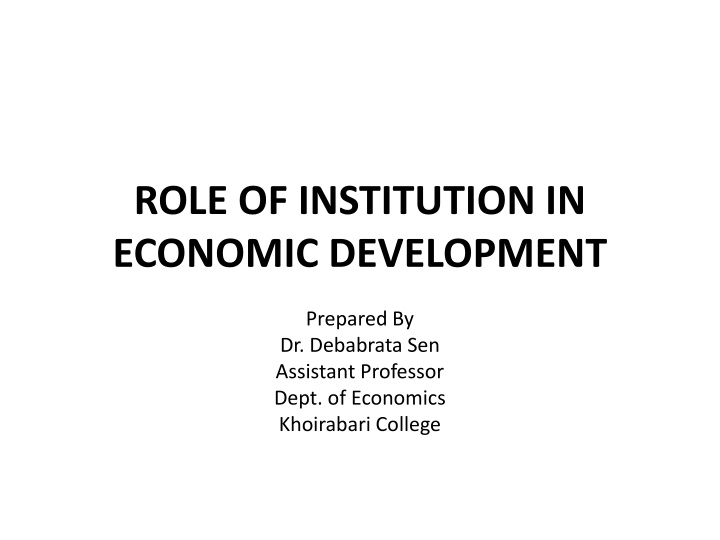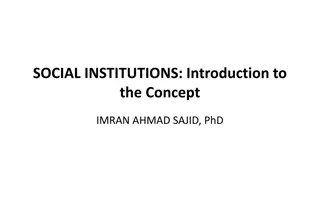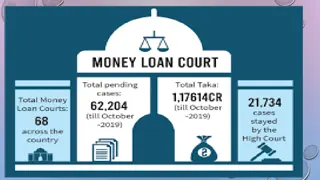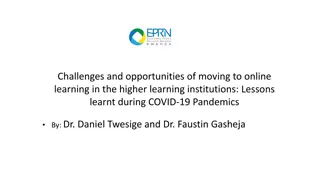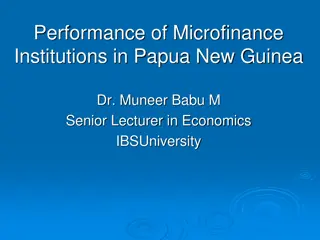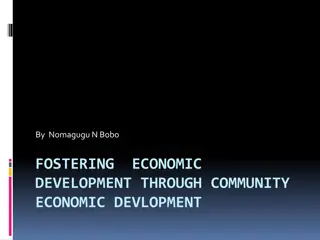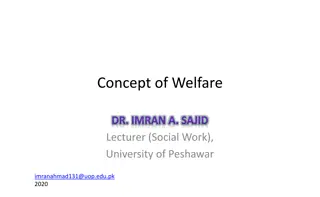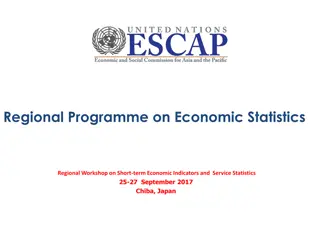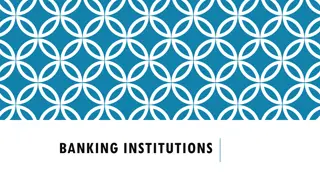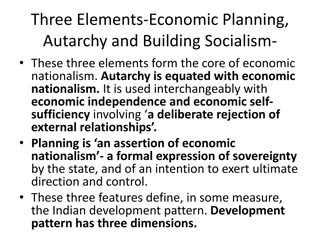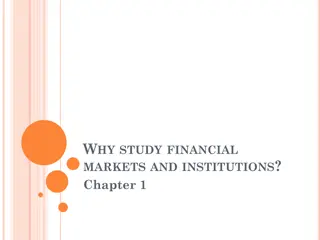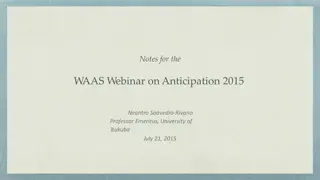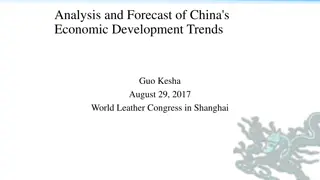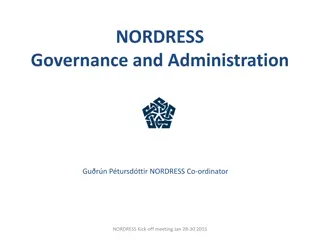Role of Institutions in Economic Development: A Comprehensive Analysis
Understanding the significance of institutions in economic development is crucial, as they play a pivotal role in shaping societal, political, and economic relations. Institutions, defined as established customs or practices, act as the rules of the game that structure human interactions. Their quality, characteristics, and development are integral for fostering economic growth and prosperity. This article delves into the meaning of institutions and their impact on economic development, shedding light on the prerequisites and characteristics of effective institutions.
Download Presentation

Please find below an Image/Link to download the presentation.
The content on the website is provided AS IS for your information and personal use only. It may not be sold, licensed, or shared on other websites without obtaining consent from the author.If you encounter any issues during the download, it is possible that the publisher has removed the file from their server.
You are allowed to download the files provided on this website for personal or commercial use, subject to the condition that they are used lawfully. All files are the property of their respective owners.
The content on the website is provided AS IS for your information and personal use only. It may not be sold, licensed, or shared on other websites without obtaining consent from the author.
E N D
Presentation Transcript
ROLE OF INSTITUTION IN ECONOMIC DEVELOPMENT Prepared By Dr. Debabrata Sen Assistant Professor Dept. of Economics Khoirabari College
CONTENT 1. Introduction 2. Understanding the meaning and concept of institutions in economic development 3. The role of Institutions Development 4. Economic and political Institutions 5. The characteristics and pre-requisites of good institutions 6. Quality of institutions 7. Conclusion in Economic
1. Introduction Basic concepts about the role of institutions in - economic development - characteristics of good institutions quality of institutions - the pre-requisites of a sound institutional structure. Economic development is a complex phenomenon involving not only the changes in output per capita which are related to the physical capita, human capital and technology but also depends upon social attitude, political conditions and various economic organizations.
2. Understanding the meaning and concept of institutions in economic development The definition of an institution is an established custom or practice, or a group of people that was formed for a specific reason or a building that houses the group of people. Marriage is an example of a cultural institution. A commonly accepted definition of institutions is that they are the formal and informal rules that organize social, political and economic relations. In his seminal work, North (1981) defines institutions as the rules of the game in a society or, more formally, are the humanly devised constraints that shape human interaction. North further elaborates those institutions can be interpreted as informal constraints and formal rules. In simple words, institution is another word for procedure, convention and arrangements.
Institution is a way of thought or action of some prevalence and permanence, which is embedded in the habits of a group or the customs of the people. According to Douglas North, Institutions are the rules of the game in a society, or more formally are the humanly devised constraints that shape human interactions . Three important features emerge from here i. That these are humanly devised constraints which contrast them with others like geographical factors beyond human control. ii. That these are the rules of the game setting constraints on human behaviour and iii. That their effect will be through incentives.
3. The role of Institutions in Economic Development A country s social and economic institution dominate the process of economic development. They determine attitudes, motivations and conditions for development. If institutions are elastic and encourage people to avail economic opportunities and further to lead higher standard of living and inspire them to work hard, then economic development will occur. Broadly these institutions can be classified into i. Economic institutions ii. Political institutions and iii. Social institutions.
Economic institutions Economic institutions do affect economic development directly investment in physical and human capital, technological changes and the organization of production. They not only affect the aggregate growth potential of the economy but the distribution of resources in the society also. as they influence
Political institutions Political institutions allocate political power and those who hold political power influence the development of political institutions. They try to maintain those institutions which give them political power. The interaction between the two will create a mechanism of persistence those who are getting more resources will have more political power and will push for such economic and political institutions which are favourable to their own interests. While political institutions work through political power economic institutions of markets, infrastructure, financial organizations, property right and economic organization like planning etc. have their influence through costs, return on investment, distribution of resources cooperation and increased social capital.
4. Economic and political Institutions The term political institution refers to institutions that shape the incentives of the political executive and determine the distribution of political power, which includes the ability to shape economic institutions and the distribution of resources. Economic institutions, by determining the relative affluence of various groups of society, also help shape political institutions. Good economic institutions are most likely to flourish in a rent-free environment, in which small groups are not able to take advantage of a monopoly position in a particular industry or activity, or privileged access to natural resources.
If political power is broadly shared and subject to checks and balances, there is much less risk that those with political power will take advantage of their position to extract rents themselves. Economic institutions not only matter because they influence investment in physical and human capital, technology and organization of production, but they also determine the distribution of resources in the society.
5. The characteristics and pre- requisites of good institutions The main characteristics of good institutions are as under: i. Institutions are purposive in the sense that each has its objectives or goals to satisfy social needs. ii. They are relatively permanent in their structure. iii. They tend to become traditional and enduring. iv. Each institution is a unified structure and functions as a unit. v. The institution is necessarily value laden and tends to become a code of conduct. vi. Each institution is affiliated and derive rights from some or other society.
6. Quality of institutions Institutional quality is a broad concept that captures law, individual rights and high quality government regulation Institutional quality development reinforce each other over the longer term. and services. economic and
7. Conclusion It is therefore evident that institutions determine the degree to which the environment is conducive to cooperation and increased social capital. Inclusive and participatory institutions not only increase the flow of information but also help to pool resources to reduce the risk and ensure substantial levels of wealth. But history of various countries shows that there are serious problems in promoting these economic and political institutions and changes in one may seriously affect the other inversely. It is due to this relationship the one must be very cautious in promoting reforms as reforms in one area may lead to the problems in another area. Due to this there are challenging problems for those who wish to solve the problem of poverty in less developed countries.
